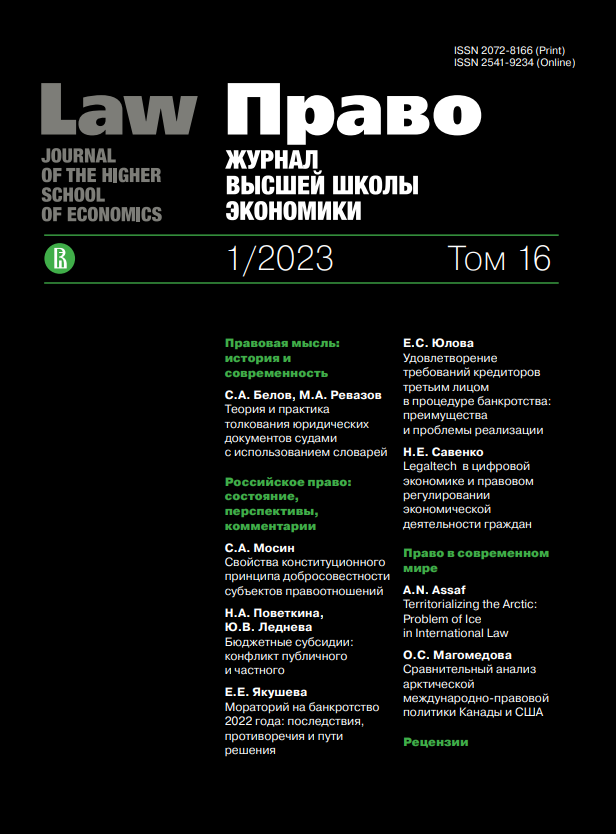Удовлетворение требований кредиторов третьим лицом в процедуре банкротства: преимущества и проблемы реализации
Аннотация
В нынешних геополитических условиях возрастает важность защиты отечественного предпринимательства и граждан, попавших в трудное финансовое положение. В настоящей статье рассматривается одно из правовых средств такой защиты, которое позволяет прекратить производство по делу о несостоятельности, предотвратить продажу имущества должника с торгов и закрытие бизнеса, снизить расходы на процедуры банкротства. Цель исследования — проанализировать механизм исполнения требований кредиторов третьими лицами и существующие на практике препятствия его реализации. Методы исследования: диалектический, формально-логический, системный, формально-юридический. Автором показаны преимущества исполнения требований кредиторов третьим лицом для должника, контролирующих его лиц и реестровых кредиторов. Выявлены основные проблемы, препятствующие надлежащей реализации данного механизма, в том числе обусловленные противоправными действиями и бездействием арбитражных управляющих. Особое внимание уделено распространенной проблеме выставления арбитражным управляющим имущества должника на торги, несмотря на то, что третье лицо уже заявило о намерении исполнить все требования кредиторов либо их исполнило. Рассмотрена практика обеспечительных мер в качестве средства защиты имущества должника от продажи в период прохождения этапов такого исполнения. В целях решения выявленных проблем сделаны предложения о корректировке порядка и сроков проведения отдельных этапов процедуры исполнения требований кредиторов третьим лицом, состава обязанностей и системы вознаграждения арбитражных управляющих. Сделан вывод о необходимости установить законодательный запрет арбитражному управляющему отчуждать имущество должника с даты удовлетворения арбитражным судом заявления о намерении исполнить обязательства должника. Предложено ввести обязанность управляющего приостановить проведение торгов, а также заключение договора продажи объектов конкурсной массы в случае внесения третьим лицом денежных средств на депозит суда в целях удовлетворения требований кредиторов. Даны иные предложения по решению проблем, возникающих в связи с исполнением требований в порядке статей 113, 125 Закона о банкротстве.Литература
Apevalova E.A. (2018) The Russian model of the institute of insolvency: the evolution of the Insolvency Law of 2002. Predprinimatelskoe pravo=Entrepreneurial Law, no. 3, pp. 16-20 (in Russ.)
Belyaev S.G. (2021) Bankruptcy: a dream and reality. Arbitrazhnyi upravliayushiy=Arbitration Manager, no. 2, pp. 21-24 (in Russ.)
Bolotov M.V. (2020) Fulfilling obligations of a bankrupt debtor by a third party in an individual bankruptcy proceedings. Pravo i politika=Law and Politics, no. 9, pp. 56-64. DOI: https://doi.org/10.7256/2454-0706.2020.9.33880
Dickfos J. (2015) The Costs and Benefits of Regulating the Market for Corporate Insolvency Practitioner Remuneration. International Insolvency Review, vol. 25, no. 1, pp. 56-71. DOI: https://doi.org/10.1002/iir.1239
Galkin S.S. (2015) Termination of bankruptcy proceedings as a legal means of protecting the debtor and creditors. Predprinimatelskoe pravo=Entrepreneurial Law, no. 1, pp. 53-59 (in Russ.)
Insolvency in the legal system of Russia and foreign countries: theory and practice (2020) S.A. Karelin, I.V. Frolov (eds.). Moscow: Justicinform, 360 p. (in Russ.)
Kolesnikova S.G., Teplyukova L.S. (2021) Interim measures by arbitration courts in a bankruptcy case. Arbitrazhnye spory=Arbitration Disputes, no. 2, pp. 5-62 (in Russ.)
Korshunov P.N. (2020) The role of self-regulating organizations of arbitration managers in the administration of justice in bankruptcy cases. Jurist=Lawyer, no. 3. pp. 16-23 (in Russ.) DOI: https://doi.org/10.18572/1812-3929-2020-3-16-23
Miftakhutdinov R.T., Shaidullin A.I. (2020) Downgrading (subordination) of the claims of the controlling debtor or affiliated persons in the Russian bankruptcy law. Vestnik ekonomicheskogo pravosudia=Bulletin of Economic Justice, no. 9, pp. 3-136 (in Russ.)
Nalbandian E.L. (2020) Efficiency of bankruptcy procedures implementing to satisfy creditors' claims. Jurist=Lawyer, no. 3, pp. 29-37 (in Russ.) DOI: https://doi.org/10.18572/1812-3929-2020-3-29-37
Pavlova L.N. (2017) Application of the institution of performance of obligations by a third party in cases of insolvency of debtors. Zakon=Law, no. 1, pp. 38-47 (in Russ.)
Papilin I.I. (2022) Fulfilling obligations by a third party for the debtor in bankruptcy. Vestnik ekonomicheskogo pravosudia=Bulletin of Economic Justice, no. 2, pp. 7692 (in Russ.)
Petrov D.A. (2018) Fulfilling obligations of a bankrupt debtor by a third party or founder. Arbitrazhnye spory=Arbitration Disputes, no. 4, pp. 126-136 (in Russ.)
Popondopulo V.F. (2021) The Russian system of legislative regulating bankruptcy relations: conditions and development trends. Jurist=Lawyer, no. 5, pp. 10-16 (in Russ.) DOI: https://doi.org/10.18572/1812-3929-2021-5-10-16
Sviridenko O.M. (2018) Legal regulation of the liability of the arbitration manager. Lex russica, no. 8, pp. 96-104 (in Russ.)
Sklovsky K.I. (2019) Transaction and its effect. Commentary to Chapter 9 of the Russian Civil Code. Moscow: Statute, 278 p. (in Russ.)
Telyukina M.V. (2003) Fulfillment by third parties of the debtor's obligations during external management. Ekonomika i pravo=Economy and Law, no. 2, pp. 30-33 (in Russ.)
Shishmareva T. P. (2022) Legal means of effective rehabilitation of a debtor or its enterprise in restricting procedures in Russia and Germany. Vestnik Sankt Peterburgskogo universiteta=Bulletin of Saint Petersburg University, no. 4, pp. 1128-1136. DOI: https://doi.org/10.21638/spbu14.2021.420
Van Dijck G., Hollemans R. et al. (2020) Insolvency judges meet strategic behavior: A comparative empirical study. Maastricht Journal of European and Comparative Law, no. 2, pp. 158-177. DOI: https://doi.org/10.1177/1023263X20906669
Vatlin L.A. (2020) Institute of performance of obligations by a third party in the legislation on insolvency (bankruptcy). Vestnik arbitrazhnoy praktiki=Bulletin of Arbitration Practice, no. 6, pp. 27-34 (in Russ.)
Vitryansky V. (2017) Judicial interpretation of some novels on the fulfillment of obligations and responsibility for their violation. Khoziaistvo i pravo=Economy and Law, no. 3, pp. 3-48 (in Russ.)
Volberda H. (2021) Crises, creditors and cramdowns: an evaluation of the protection of minority creditors under the WHOA in light of Directive (EU) 2019/1023. Utrecht Law Review, no. 3, pp. 65-79.
Copyright (c) 2023 Право. Журнал Высшей школы экономики

Это произведение доступно по лицензии Creative Commons «Attribution-ShareAlike» («Атрибуция — На тех же условиях») 4.0 Всемирная.


















